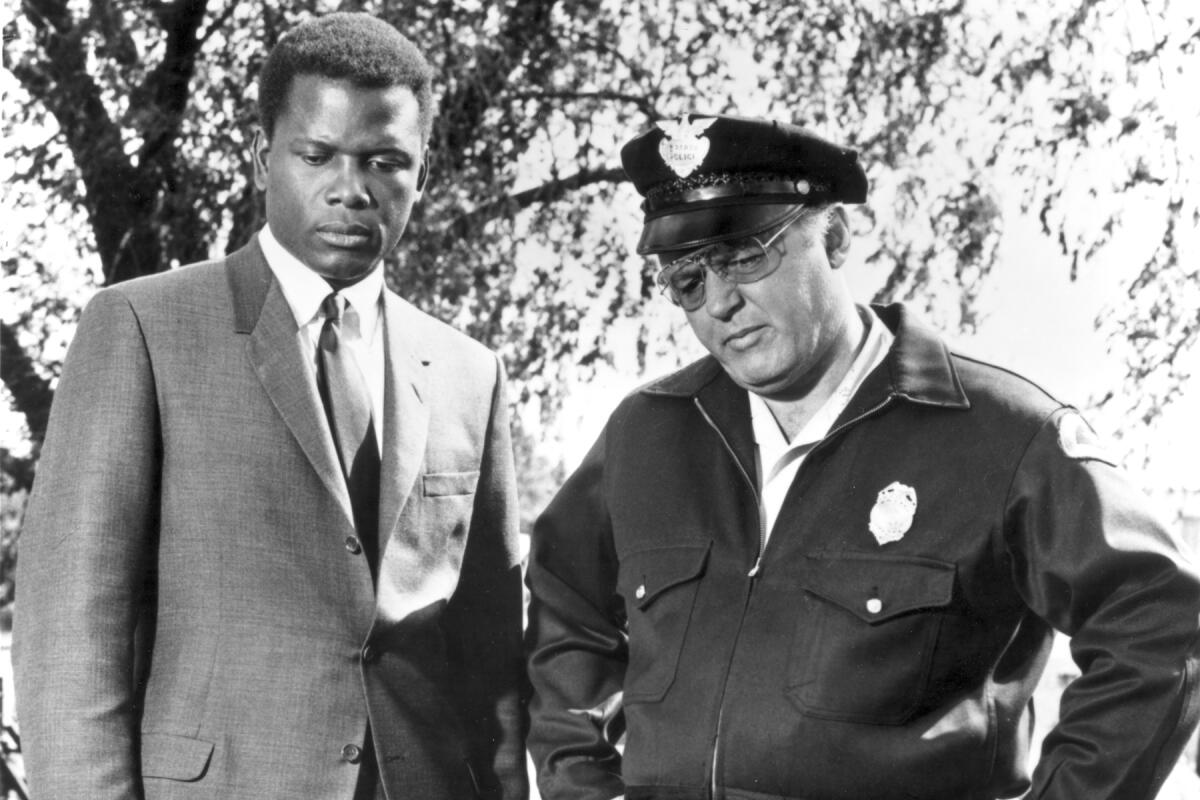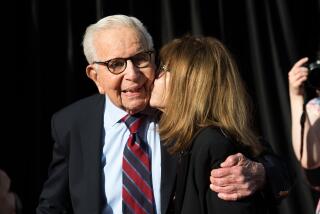From the Archives: Poitier and Steiger star in ‘In the Heat of the Night’

- Share via
In many ways “In the Heat of the Night” may turn out to be this year’s “The Russians Are Coming, the Russians Are Coming,” which would be less than entirely coincidental since young Norman Jewison has been the director in both instances.
In both films there is acute satiric observation of attitudes prevailing in our society and the chance to laugh at them (sometimes loudly, sometimes in chagrin and sometimes not at all). In both films there is acute observation of place, even if it is masquerading as a fictional place.
Smooth entertainment
And in both films, there is a laudable and primer-simple preachment to be derived, although in both cases the message is packaged as a smooth and beguiling entertainment, a good story told as well as movie stories can be told. Oddly enough, both films can be taken for more than they are (holding some deeper social message) or for less than they are (mere entertainments tarted up with heavy-handed and over-obvious messages). The truth is probably not strenuously in one direction or the other.
“Russians” suggested that we are morbidly afraid of each other but underneath the accents much alike and good guys. “In the Heat of the Night” suggests that racial hatreds in Mississippi run deep but that, deeper still, we are all men and that if we can overcome the hang-ups imposed by tradition, much alike and good guys. You have to believe that it’s not what they say, it’s the way they say it, and you’re absolutely right.
Visit his mother
Here we have Sidney Poitier as a Philadelphian visiting his mother in the old hometown of Sparta, Miss. There’s an important murder. He’s an early suspect, only because he’s wearing money and a suit in a region where Negroes presumably do without either.
The confrontation with Rod Steiger as a potbellied, gum-chewing tough sheriff is cruel and funny. The lovely surprise is that Poitier is a homicide dick, and a good one, persuaded to, dissuaded from and re-persuaded to help the sheriff (who wouldn’t know a bruise from a .45 exit wound) solve the crime.
So it’s a murder mystery movie, although in those strict terms not entirely a satisfactory one since we don’t always see the detecting and what we do see makes it unclear that anybody would tell him the time of day, let alone what time the white cop stopped to ogle the exhibitionist white sexpot.
But what we’re after is the confrontation of Negro detective with a Southern town reluctant (defiantly) to believe that any Negroes anywhere have stopped saying “yassuh boss” and shufflin’ along. They have, and the confrontation is often marvelous, as in a meeting with the big (white) man on the hill who has run the town his way for decades. Fine, too, is a long edgy scene in which Poitier and Steiger get mildly bombed together.
The final link between the two films is the startling quality of the acting. Poitier is simply one of the finest actors anywhere, and reconfirms it here. And it’s hard to recall a role in which Steiger has seemed more engaging and less the studied actor.
Roles neatly done
The other roles are also neatly done, notably Lee Grant as a victim’s widow, Scott Wilson (one of the “In Cold Blood” killers now) as another suspect, Larry Gates as the old bigot and Warren Oates as another cop.
Comparison, with “Russians,” that is, is no bad thing: an indication of strengths (not the least at the box office), if also of (deliberate) limitations. It is one of those entertainments which does a little more for you.
Quincy Jones’ score is one of the best, catching the mood and the time, which is right now.
More to Read
Only good movies
Get the Indie Focus newsletter, Mark Olsen's weekly guide to the world of cinema.
You may occasionally receive promotional content from the Los Angeles Times.










